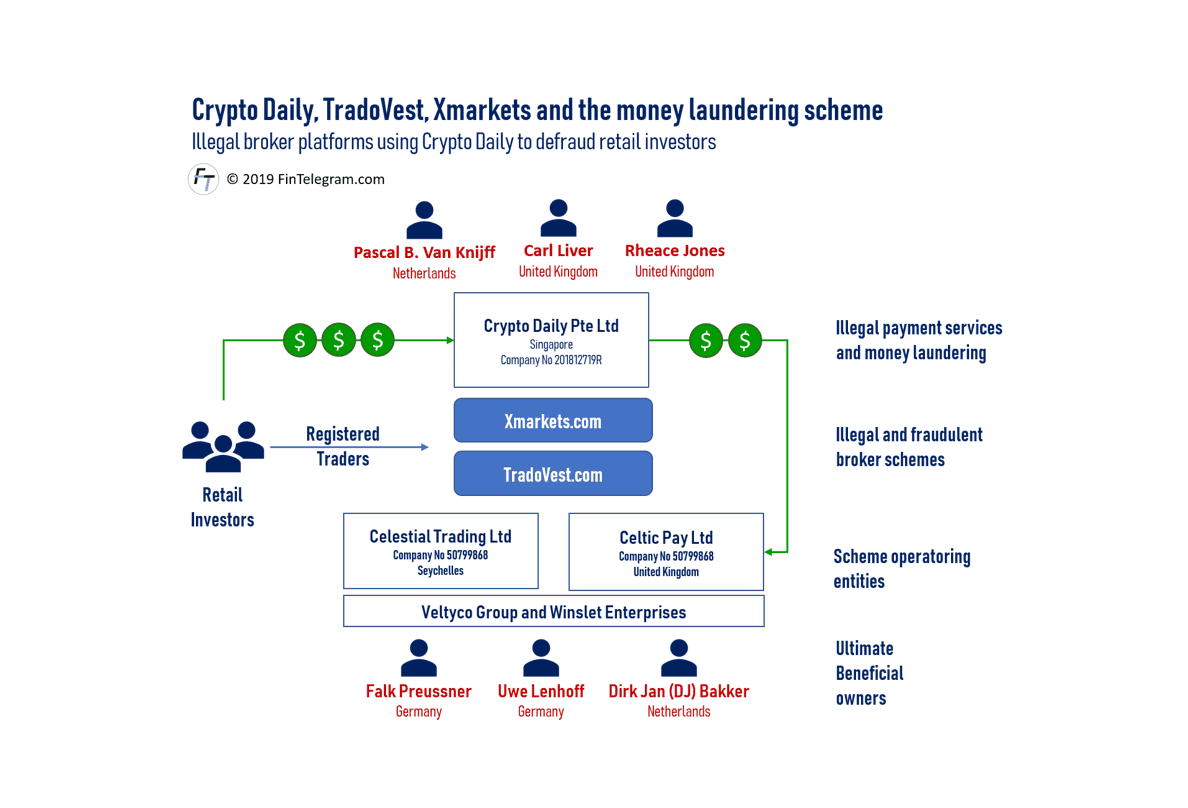The world of the scammer is a global and well-connected ecosphere. And so is the world of illegal payment processors. There are thousands of unauthorized and illegal payment processors worldwide. These illegal payment processors are mainly used for the processing of bank transfers from victims of scams. These illegal payment processors include the crypto news platform CryptoDaily and its organization. Read the incredible story.
How illegal payment processors work
Illegal payment processors are typically companies that are active or dormant companies in various perfectly legal business segments such as construction, IT consulting, or antique trade. They conclude so-called Payment Processing Agreements with the operators of scams and cybercrime organizations. Hence, scammers become their clients. They then receive bank wires from victims of these scams in their bank accounts and forward them to the scammers. Boiler room agents of the scammers provide the victims with the bank details and instruct them to give a payment reference that matches the business of the illegal payment processor. For the forwarding of the money to the scammers’ bank accounts, they usually receive a corresponding consulting invoice.
So theses illicit payments are disguised, the money stolen from the unsuspecting customers is laundered in the first place. In return, these payment processors receive attractive commissions of up to 20%.
The CryptoDaily Case
One of these illegal payment processors is the Crypto Daily Pte. Ltd., a company registered in Singapore in 2018. The company is focused on publishing and forex transactions in the cryptocurrency segment. It operates the online medium CryptoDaily under the domains www.cryptodaily.co.uk and www.cryptodaily.net. In addition, CryptoDaily provides cryptocurrency exchange services through its Estonian entity which allegedly holds a respective Estonian FIU license. A perfect combination for scammers.
The cybercrime organization of the German Uwe Lenhoff has used the bank accounts of CryptoDaily to process bank wires of victims of their scams, such as XMarkets or TradoVest. The latter two were some of Lenhoff’s large binary options and broker scams. At the time of the partnership between Lenhoff and CryptoDaily, public investor warnings had long been issued by financial market supervisory authorities in various jurisdictions.

Uwe Lenhoff and his Israeli partner Gal Barak were arrested in early 2019 as suspected heads of a cybercrime organization on suspicion of investment fraud and money-laundering. Lenhoff was held in custody in Germany until his death on July 6, 2020, and awaited trial with around a dozen accomplices. The cause of his sudden death in his prison cell is not yet known. The results of the autopsy are still pending.
CryptoDaily not only laundered money for Lenhoff as an illegal payment processor but also wrote a slanderous article about FinTelegram News and its founder and publisher. On behalf of Lenhoff and in return for a good payment. It is clear from court records, police wiretapping protocols, and seized documents that Lenhoff, with the support of CryptoDaily, wanted to slander FinTelegram News and its people. This was to prevent critical reporting about Lenhoff and his scams.
Latest Developments
In July 2020, FinTelegram News was contacted by Pascal van Knijf, a dutch citizen and the Chief Strategy Officer of CryptoDaily (see his LinkedIn profile).
In 2019, van Knijf was listed on the website as one of three officers of CryptoDaily. Next to him were Carl Liver (LinkedIn profile), and Rheace Jones (LinkedIn profile). Pascal van Knijf is even the first to be mentioned. Van Knijf is also the founder of the crypto-organization Future of Trust in the Netherlands, where CryptoDaily is also a partner.

In his email statement to FinTelegram News van Knijf now claims that he was actually only a freelancer and had nothing to do with the operational business of CryptoDaily. He would also not have known about the partnership with Lenhoff and the high payments to the bank accounts. How credible is that?
The European Funds Recovery Initiative (EFRI), which represents victims of Lenhoff’s scams, has subsequently contacted van Knijf and demanded that the money stolen from Lenhoff’s scams via CryptoDaily be returned to the victims. Unsurprisingly, van Knijf then withdrew from communication. This approach is certainly not the Future of Trust. These activities are called money-laundering and cybercrime facilitating. These, in turn, are criminal acts. In addition to this, there’s libel and defamation. The CryptoDaily story is far from over!
